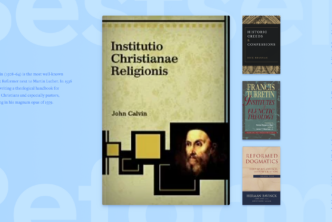
Let’s start with Karl Barth—not your garden-variety New Testament scholar. Barth is often discussed in systematic and historical theology circles, but he was serious about Scripture and wrote some very important commentaries. Romans is his most famous (as the book that launched a thousand controversies), but also I want to mention his Philippians commentary which, though quite brief, is also rich in theological insight. So make sure you get a chance to read a “Barth” commentary.
On an entirely different note, we have J. Christiaan Beker. Beker is known for his contributions to seeing Paul’s theology in apocalyptic categories—especially the triumph of the hostile cosmic powers. I would recommend his Paul’s Apocalyptic Gospel. I used to think that Jesus’ salvific gift was essentially heavenly paperwork that erased my debt of sin. Beker was one of those leading figures who helped me to see the cosmic, world-transforming, powerful nature of God’s rescue operation in and through Jesus Christ.
Next we have Michael F. Bird. Bird is a “renaissance man” in NT scholarship, having published in Jesus studies, gospels, early Judaism, Paul, and now even systematic theology! But perhaps one of his most lasting and significant contributions is his work on Paul’s soteriology and especially the language of justification/righteousness. I suggest you read his The Saving Righteousness of God.
Gordon Fee should also be on your reading list. Fee is one of the most well-respected biblical scholars in all of history and for good reason. He has earned a reputation as a first-rate commentator (1 Corinthians, Philippians, 1–2 Thessalonians), as well as a textual critic. But he is most appreciated for his work on Paul’s understanding of the Holy Spirit. You could read his magnum opus, God’s Empowering Presence, but I would suggest starting with his shorter work, Paul, the Spirit, and the People of God. This book rocked my world in seminary and put some important pieces of the Pauline-theological puzzle together for me (pneumatology, salvation history, eschatology, anthropology, ecclesiology).
In the study of Paul, there has been a long history of interest in his doctrines, particularly of salvation. But I have been fascinated with Paul’s view of the life lived in obedience to God, or his ethics. On that subject there are few books as important as Victor Furnish’s now classic Theology and Ethics in Paul. Furnish shows, quite convincingly, that Paul’s “ethics” are not just another area of his life, but naturally flow out of his theology. One cannot understand Jesus Christ rightly without it having an effect on his or her life. A brilliant “must-read!”
This list would be incomplete without Beverly Gaventa, but where to begin? She has written so many fine works on Paul. One might point to her outstanding commentary on 1–2 Thessalonians (Interpretation series), but I would first recommend reading a collection of her Pauline essays called Our Mother Saint Paul. Gaventa excels at drawing out the dynamism of Paul’s apocalyptic theology and the richness of his use of metaphors.
Going back to the subject of theology and ethics (see Furnish above), we have the work of Michael J. Gorman. Gorman, like Bird, has worked in a number of areas (exegesis, theological hermeneutics, Revelation), but I sense that Paul is his first love. Gorman’s book on Paul’s theology of the cross, Cruciformity, has had an incalculable impact on my understanding of Paul, so much so that several articles I have published draw from Gorman’s theo-hermeneutical framework, and I even named my blog “Crux Sola” (the cross alone) as the key theological concept that motivates my scholarship. (I would be failing to offer the best advice possible to you if I didn’t also mention Gorman’s Elements of Biblical Exegesis and his Apostle of the Crucified Lord—both being my favorite textbooks in their respective areas.)
Few scholars have done more to shape and move forward Pauline scholarship than Richard B. Hays. His wheelhouse is Paul’s use of the Old Testament, but every single Christian with a brain and a pair of eyes needs to read his epochal Moral Vision of the New Testament. This is actually a book about the whole New Testament, but his reading of Paul is particularly strong. If you don’t already own it, buy a copy, plan a time to read it, and buy some tape because you will wear it out.
If Hays’ Moral Vision is an important general work, then our most significant specific work is by Joseph Hellerman—Reconstructing Honor in Roman Philippi. Don’t let the title fool you, this book is not simply a socio-historical, geographic, or archaeological study. It is a powerful contextualization of Paul’s subversive, turning-your-world-upside-down theology. If you are willing to patiently read a hefty scholarly monograph, this book will repay you many times over. I have read this work several times, and I always refer to Hellerman’s insights when I teach introductions to Paul. (For those of you less likely to read a scholarly monograph, many of his insights are re-expressed more accessibly in his recent book Embracing Shared Ministry: Power and Status in the Early Church and Why Its Matters.)
Hellerman is a social historian and he shows his strengths in that area. But the “watershed moment” for Pauline scholars taking an interest in the social world of Paul is the book The First Urban Christians by Wayne Meeks. This book focuses on the context and ministry of Paul. Like almost no other, it takes you into the real-life world of Paul, on the ground with him in the city streets where he did ministry. Reading this book is like transforming your understanding of Paul from black and white to full, brilliant color.
And, again, thinking about social history, we have Francis B. Watson, a Pauline expert who was also one of two examiners for my doctoral defense (he passed me!). I recently had a chance to catch-up with Watson and interview him about his new book called Gospel Writing. But my first “Watson book” was his Paul, Judaism, and the Gentiles, a book (in some ways like Meeks) that fleshed out the real, rough-and-tumble world of life for Paul—a life fraught with accusations, hostility, persecution, and rejection. Watson helped me to understand that Paul was no ivory-tower theologian. He didn’t have book contracts or a blog. His “theology” developed through “social correlates”—real life circumstances and relationships that demanded his articulation of the truth of the gospel. Brilliant stuff, if provocative and controversial at times.
As much as monographs (as we have with Hellerman and Watson) help us to think about Paul’s life and his churches, we obviously rely on close study of his letters to make sense of him. So, we have commentaries to guide us. There are few commentators more capable and interesting than Ben Witherington III. I cut my teeth exegetically on his Chaos and Community in Corinth, and I must own at least ten or twelve other commentaries in the Witherington collection. He is an extremely bright scholar, he is a talented writer (even of fiction), and he has a pastoral heart (a combination you don’t come across very often).
And last but not least, N.T. Wright. You knew it was coming. Where to begin! The class that got me hooked on NT scholarship and even, perhaps, going down the academic path, is an introduction to Paul (taught by the esteemed Roy Ciampa of Gordon-Conwell Seminary) where we were required to read What Saint Paul Really Said by Wright. At that time, I did not even know who Wright was and I had never heard of “the New Perspective on Paul.” That short book knocked me off of my theological seat! Whatever random categories I had for Pauline theology were stripped away and I began to think about Paul as a Jew, in view of the story of God traced through the Old Testament, and in light of the appearance, life, death, resurrection, and reign of Jesus the Messiah who formed a new people around himself and the Holy Spirit! (If you dare, you might pick up his gargantuan Paul and the Faithfulness of God—I am currently on page 456 . . . of 1600).
That’s it for Paul. Tough to keep the list short, but the show must continue on. Next up is New Testament Background.
Save 50% off a Pauline Studies Bundle

Pauline Studies Bundle, ver. 2
These bundles were assembled to help you build a library well equipped for in-depth Pauline studies. With titles from dozens of scholars, these are well-rounded collections that study Paul’s doctrine, social context, specific epistles, and the Pauline epistles’ relations to the rest of the New Testament. Start building your Pauline studies library today with one of these four bundles!
Small (10 vols.)—$79.95 after discount! Buy now.
Medium (19 vols.)—$144.95 after discount! Buy now.
Large (33 vols.)—$229.95 after discount! Buy now.
X-Large (47 vols.)—$339.95 after discount! Buy now.
This discount for Logos Academic readers will only last until February 14, so grab a bundle today and use coupon code NGPAUL at checkout.




